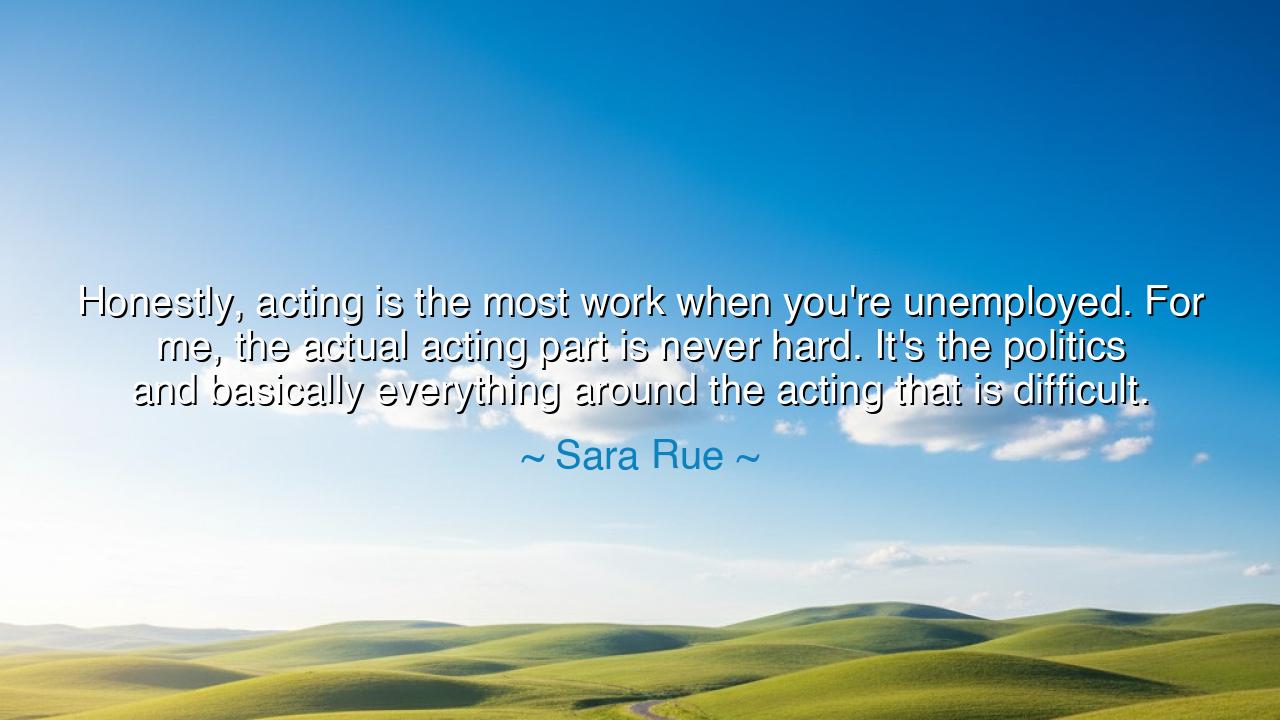
Honestly, acting is the most work when you're unemployed. For
Honestly, acting is the most work when you're unemployed. For me, the actual acting part is never hard. It's the politics and basically everything around the acting that is difficult.






Art is often seen as a realm of pure passion and beauty, yet behind its shimmering veil lies a world of struggle and uncertainty. When Sara Rue declared, “Honestly, acting is the most work when you're unemployed. For me, the actual acting part is never hard. It's the politics and basically everything around the acting that is difficult,” she unveiled the hidden reality faced by countless artists: that the craft itself may bring joy and ease, but the world surrounding it—filled with ambition, competition, and politics—is where the true hardship lies.
At the heart of her words is a profound truth about labor and purpose. The act of performance, for one devoted to their craft, flows naturally, like a musician’s fingers gliding across strings or a poet’s words spilling forth onto paper. This is the realm of pure creation, where the soul moves freely. But outside this sacred space, there is a maze of casting calls, negotiations, reputations, and industry power struggles. For the artist, the battle to find work can be more exhausting than the work itself. Thus, when Rue speaks of unemployment being the hardest time, she highlights the emotional toll of waiting and striving for opportunities beyond one’s control.
History offers many examples of this struggle. Consider the life of Vincent van Gogh, whose paintings now inspire millions. The act of painting was his joy and his salvation, yet during his lifetime, he faced relentless poverty and rejection. His art was never the source of his suffering; rather, it was the world around him—the lack of recognition, the politics of galleries and patrons, and the indifference of society—that weighed upon him like a storm. In a similar way, actors and performers may find their deepest hardships not on the stage but in the machinery of the industry.
Sara Rue’s mention of politics reveals another layer of wisdom. In many fields, success is not based solely on talent or effort. There are relationships to navigate, unspoken hierarchies to respect, and often unfair barriers to overcome. This reality can be disheartening, especially for those who seek only to practice their craft. The true test of endurance, then, lies not in the art itself, but in maintaining one’s integrity and passion amidst a system that often values appearances and power over truth.
On a personal level, Rue’s reflection speaks to all who labor in professions where external forces shape their path. Whether in art, business, or politics, there is a universal struggle between the inner work of mastery and the outer work of survival. Her words encourage us to find strength in the joy of the craft itself, even when the surrounding world is turbulent. The artist must remember that their worth lies not in the whims of the industry, but in the authenticity of their creation.
Let this lesson be carried through the ages: true work begins when the world resists your calling. As Sara Rue teaches, the act of creation may be a gift, but the journey to share that gift is fraught with trials. The wise artist endures by clinging to the love of their craft, navigating the politics of the world with patience and courage, until at last the curtain rises and the truth of their art is seen.






AAdministratorAdministrator
Welcome, honored guests. Please leave a comment, we will respond soon